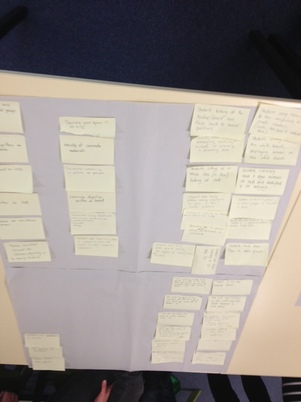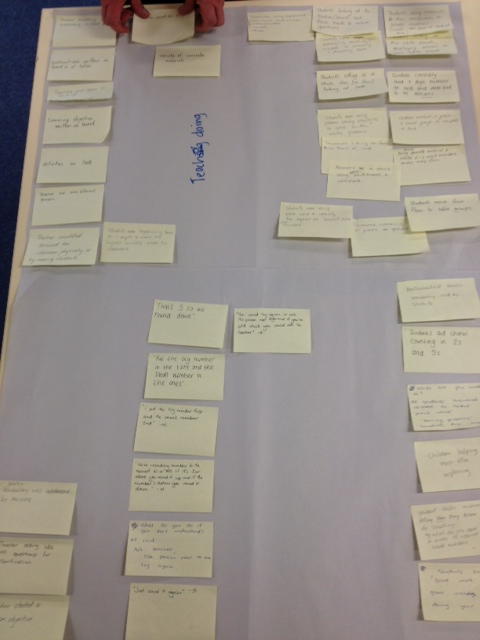Summarise - What did we see, what evidence do we have, how can we group this evidence?
Share your evidence with the staff, work together to group the evidence across both teams in at least 2 different ways?
Share your evidence with the staff, work together to group the evidence across both teams in at least 2 different ways?
Predict - If this is what is happening in classrooms, what predictions can we make about the what students are learning?
Work with a partner from a different team to analyse the evidence and make some predictions about what this tells us about student learning.
They're learning to make 2 digit numbers
They're learning to have another go if they make a mistake or check work
They're learning to create work of a high standard.
They're learning to work collaboratively.
They understand the point of the lesson.
They learn to count in 2s and 5s.
Students are learning different ways to solve a problem or get help if they don't know what to do.
They are learning to articulate what they are doing and explain their strategy.
Students are learning to use mathematical vocabulary.
Students are learning to use different materials.
Students are learning to use different materials and recording methods to show their learning.
Students are learning to improve their understanding through a variety of resources and materials.
Work with a partner from a different team to analyse the evidence and make some predictions about what this tells us about student learning.
They're learning to make 2 digit numbers
They're learning to have another go if they make a mistake or check work
They're learning to create work of a high standard.
They're learning to work collaboratively.
They understand the point of the lesson.
They learn to count in 2s and 5s.
Students are learning different ways to solve a problem or get help if they don't know what to do.
They are learning to articulate what they are doing and explain their strategy.
Students are learning to use mathematical vocabulary.
Students are learning to use different materials.
Students are learning to use different materials and recording methods to show their learning.
Students are learning to improve their understanding through a variety of resources and materials.
Recommend - Based on these predicions, what would you recommend we focus on?
Discuss with a partner some areas that might make a positive differentions to student learning.
Student questioning - around purpose of learning, what they could do with it, why, using questioning to lead/make meaning of and from the learning.
Relating learning to real world context.
Discovery/inquiry learning.
Student reflection on and evaluation of learning - use this to develop questions?
Improve processes for self assessment.
Discuss with a partner some areas that might make a positive differentions to student learning.
Student questioning - around purpose of learning, what they could do with it, why, using questioning to lead/make meaning of and from the learning.
Relating learning to real world context.
Discovery/inquiry learning.
Student reflection on and evaluation of learning - use this to develop questions?
Improve processes for self assessment.
A Theory of Action - Use these recommendations to develop a serious of 'If...then...' statements that will be used to develop the TPL program.
If teachers learn about different strategies to enable students to ask questions then teachers might feel more confident about including question time in their mathematics lessons.
If question time is explicitly allowed for and scaffolded then students might begin to ask more questions about their learning.
If students begin to ask more questions about their learning they might begin to take more ownership and direction of their learning.
If students take more ownership and direction of their learning they might make better connections to their learning.
If students make better connections to their learning then they might be more engaged.
If students are more engaged in learning then they might be more motivated to gain a deeper learning of the content and skills.
If students gain a deeper understanding of the content and skills their ability to attack problems might improve.
If their ability to attack problems improves students might achieve better results in mathematics.
Lesson structure - explicit sections in lesson for questions.
Question walls - add to/answer.
Traffic lights, maths rubric.
If teachers learn about different strategies to enable students to ask questions then teachers might feel more confident about including question time in their mathematics lessons.
If question time is explicitly allowed for and scaffolded then students might begin to ask more questions about their learning.
If students begin to ask more questions about their learning they might begin to take more ownership and direction of their learning.
If students take more ownership and direction of their learning they might make better connections to their learning.
If students make better connections to their learning then they might be more engaged.
If students are more engaged in learning then they might be more motivated to gain a deeper learning of the content and skills.
If students gain a deeper understanding of the content and skills their ability to attack problems might improve.
If their ability to attack problems improves students might achieve better results in mathematics.
Lesson structure - explicit sections in lesson for questions.
Question walls - add to/answer.
Traffic lights, maths rubric.


